
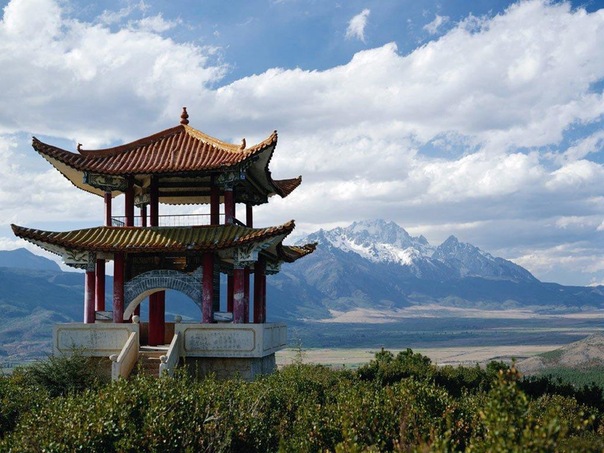
China - a country in Central and East
Asia. It has borders with Mongolia and Russia in the north-east with
Russia and North Korea - in the South Vietnam, Myanmar, Laos, India,
Bhutan and Nepal in the west - with Pakistan, Afghanistan and Tajikistan
in the north-west - c Kyrgyzstan and Kazakhstan. In the east and
south-east coast of the country is washed by the Bohai, Yellow, East
China and South China seas (the length of the coastline - 18 thousand
km.), The country has more than 3.4 thousand islands. Tours in China.
China - the third country has an area of the world (9.6 million sq.
km.).. Kitayakrayne relief is diverse - from framed highest ranges of
Asia Tibetan Plateau (average height of about 4500 m) to the south-west
and high plains and mountains of the eastern Tien Shan in the
north-west, to the Loess Plateau and the lowlands of the North China
Plain to the east. In the northeast, the chain pulled low Manchu-Korean
Xing'an Mountains and, in the south - the mountains and the
Yunnan-Nanlin Guychzhouskoe Highlands. Rocky desert Taklamakan and Gobi
occupy large areas in the north and west of the country, and cultivated
subtropical forests - the south-east of the country.
Climate in China
Varies greatly in
different parts of the country within 3 climatic zones: temperate
continental (west and north) with hot summers and mild winters, the
subtropical central regions and tropical monsoon in the southern coast
and islands. A characteristic feature is the very high humidity in the
summer in many central and southern areas.
The average temperature in northern winter about -7 C (not uncommon, and
-20 � C), summer is about 22 C, and quite dry. In the central part of
China in winter from 0 C to -5 � C in the summer - about 20 C. In
southern winter from 6 C to 15 C in summer - above 25 C.
Annual rainfall varies from 2000-2500 mm. in the south and east, to
50-100 mm. in the northern and western regions. Winter and fall often
powerful typhoons in the south and desiccating winds in the northern and
western parts of the country.
The ideal time to travel to China - late spring, especially in May, or
fall from September to October, and in the south in November - December.
Traditions of China
Among the inhabitants of
ancient China was a cult of Heaven, nature spirits and dead ancestors.
It was assumed that all the troubles caused by bad deeds that made
people, and because of improper government staged.
Respect for nature and its phenomena was made in almost all ancient
religions, but it is in China-based harmonically advanced society was
considered obedience and adherence to the laws of the universe. Depth
study of these laws in the latter resulted in one of the most popular in
this time of national traditions of China, which has become widespread
in many countries of the world - the laws of Feng Shui.
Since the 5th century BC, the dominant religion on Chinese soil is
Confucianism. Its purpose is to aid in the virtuous man (having a sense
of duty, high moral character, revered senior, etc.) to achieve the
construction of a harmonious developing society.
At the same time, the country was Taoism, which is based on an intuitive
knowledge of being. This doctrine called for the people of China to
become one with nature, away from the artificial. According to the
Taoists, this could help to not only live a long life, but even closer
to immortality.
That Taoists, based on the foundations of the philosophy of Buddhism,
isolated wood, fire, earth, water and metal - as the top 5 natural
elements, and developed still widely known system of yin and yang.
The above two religious currents have imposed great impact on the
culture and traditions of China and their role in the history of the
country is enormous.
Drugihobychaev and traditions of ancient traditions Kitayavydelyayut
hygiene. Hygienic tradition in ancient China adhered strictly enough.
For example, most people do not allow themselves to eat from dirty
dishes or wash your hands. Prevention of lice was sostriganie hair
shaved. All this is indicative of a high and rubbing the development of
ancient Chinese society.
Attractions in China
Chongqing
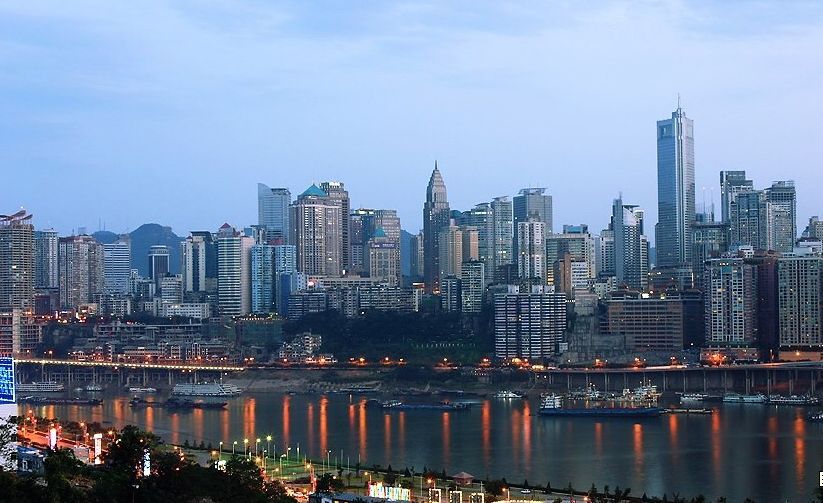
Chongqing - one of the oldest cities in China, its history goes back more than three thousand years. The city is known for its old, clinging to the slopes of the mountains, neighborhoods, hot springs, picturesque foothills Tszinyunshan and Nanshan, and Oolong nearby caves, forest Tszinfoshan, rock carvings Dajie, colorful waterfalls on the river in Ziyang Wushan Mountains, magnificent fortress "Dyaoyuychen" in Hechuane, architectural and landscape ensemble in the county fortress Shibaochzhay Chzhunsyan, Zhang Fei's shrine in Yunyane, Buddhist monastery in the county Shuanguytan Lyanpin and "stone forest" Vanshen County. In the city the most interesting museum "Hunyantsun" memorial complex of concentration camps Kuomintang, Chiang Kai-shek's residence, Zhang Zhizhong ("Guyyuan") and Kong Xiangxi ("Kunyuan"). From the start of the many boat trips on the great Yangtze River, the thresholds Fuling and "heavenly ladder" in the district Shizhu.
Tibet
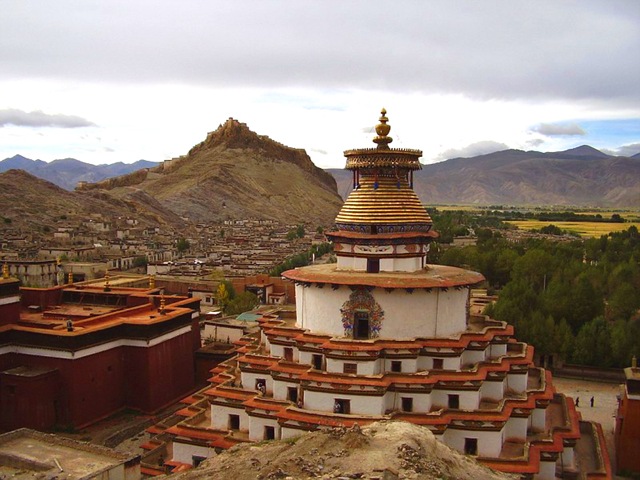
Tibet - an original edge of thousands of monasteries and ancient culture. The heart of Tibet is Lhasa with dozens of Buddhist monasteries and temples, the most famous of which is the Temple Yokhan and Patala Palace (XVII c.) - The seat of the Dalai Lama and the Tibetan Norbulingka Park (Norbug-Linkha, summer residential palace of the Dalai Lama in 1994 it was included in the UNESCO World heritage). Pilgrims who come here always try to visit the "center of the world" - a mountain range Kailash and residence of Panchen Lamas in Shigatse, the ancient Silk Road pass through the Karakoram Highway in the north, or simply enjoy the perfect conditions for trekking and stunning views of ancient Tibet.
Temple of Heaven
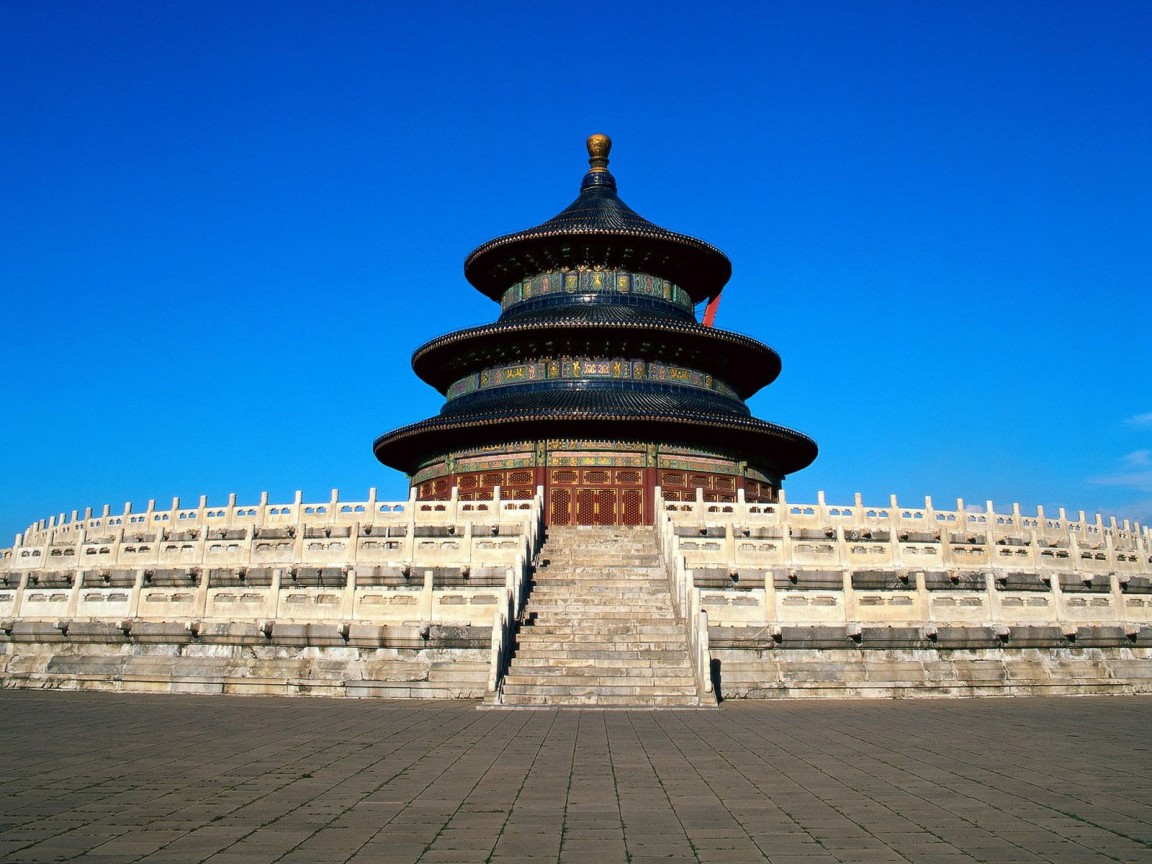
Architecture of the
Temple of Heaven in Beijing - is a magnificent structure, consisting of
four main units: The Hall of Prayer for Good Harvests, the Imperial
vault of heaven, the wall echo round the altar.
The Hall of Prayer for Good Harvests is supported by four large columns
in the center. Known as the dragon pillars, each of which represents one
of the four seasons. In the columns, as in all the palace, there is
nothing of iron. The walls and ceiling are made from a variety of wooden
beams and brackets, carved cornices expressive colors.
The dark blue sky roof of the Imperial is a jewel of the entire
structure.
The most famous part - Echo Wall. More than 70 m in diameter, it is well
known for its acoustics. If the distance of 100 meters to whisper
towards the wall, then the words will be clearly visible as well as if
the man spoke in his ear.
To the south of the altar wall of the Echo of Heaven, built entirely of
white marble. The altar has four inputs and nine steps leading down in
every direction. In the center of the upper terrace is a round stone
surrounded by nine concentric rings of stones. When the emperor comes to
pray, they will point the way for him.
Cities in China
Peking
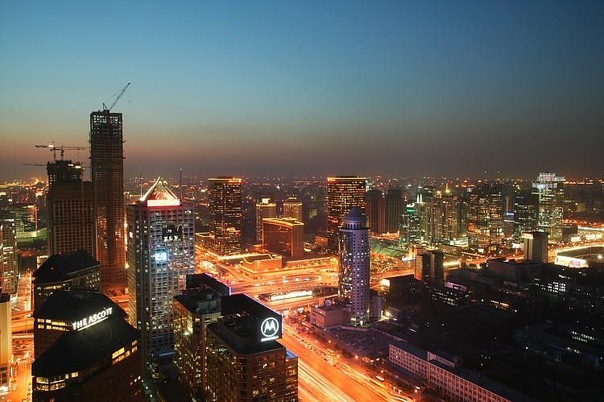 The capital of
China is, of course, Beijing. But to be more precise, Beijing and a
European and Chinese called Beijing.
The capital of
China is, of course, Beijing. But to be more precise, Beijing and a
European and Chinese called Beijing.
Amazing Beijing - the heart of the Middle Kingdom, the same Imperial
China, one of the greatest of the Middle Kingdom. Once here, you feel
the power and energy of the Empire. And even if now, in anticipation of
the Olympics, Beijing is a big, no, just a huge construction site - a
wonderful part of this city is still a lot.
Although, what's cunning, this city, of course, can not be called
pleasant for walking. But because the capital of the empire, and should
not be so, right? However, even among these streets flooded with a
stream of cars and crowds hurrying people, you can find a stunningly
beautiful place. In general, China is now living Olympics. Being
completed National Stadium, shaped nest, which will host the opening and
closing ceremonies. Ends and laying the highway from the main subway
directly to the airport. And soon there will be reached in 16 minutes,
while now driving a taxi, it takes 60.
Beijing - the ancient city. Its streets and squares imbued with the
spirit of centuries-old history, which began in the first half of the
XIII century.
What is China? Let's start with the fact that Beijing - a city built on
a clear radial-ring structure, centered on the Tiananmen Square. Under
the first, the inner ring is laid Circle Line subway. Inside this ring
is located near all the fun - that you absolutely must see when you've
visited the capital of China. Beijing attractions known: it Forbidden
City Museum in Beijing, the Great Wall of China in Badaling, Summer
Palace, Tiananmen Square, Temple of Heaven ...
In general, all the attractions of Beijing can rightly counted among the
"wonders of the world", so they hit their size, sophistication,
uniqueness and unique flavor.
Now, from poetry to prose ... Be careful not to fall for trying to
capitalize on the natural confusion of Chinese tourism. For example, in
Tiananmen Square to you can fit a decent view students, offering them
see pictures, practice English or have a drink with them a cup of tea.
Do not agree: in the best case, you lose time, and at worst - money that
will pay for their tea. And yet, it's not so terrible, since you think
that visit the country and not to communicate with the locals - this is
not correct. Another sort of entrepreneurs will be waiting for you in
the interval between Avenue Tiananmen Square and Wangfujing Street
beginning: a large number of rickshaws are aggressively offering their
services to tourists. Shamelessly bargain with them and do not agree
when they will be halfway to demand more money. You should only pay
after the trip, severely cutting off and all attempts to cajole money.
Also near Tiananmen Square actively offer trips to the Great Wall,
especially in the area Badalin. Be careful, because you can easily fall
into the tourist bus, on the way to call in countless "pearl factories",
"silk plants", "Center of Chinese medicine," and other places where you
will be trying to sell something. This is characterized by intrusive
service for routes to Badaling, but the buses to other parts of the wall
(though, indeed, some up to Badaling) will take you to the true goal.
However, in the Badaling is very easy to get public transport. By the
way, check for similar plants characteristic of the excursions offered
by many Russian travel agencies, so carefully read the tour program and
if there is any such thing to be visited, it is better to choose another
tour or any other tour operator. The rest of Beijing - quite a safe
city: people suitable to you away from the tourist attractions, really
just want to talk with you, and the Chinese taxi � ists crystal honest
and cheat tourists do not want to.
Hong Kong
 Hong Kong is
one of the world's centers of trade, so most of the guests visit it for
commercial purposes. But at the same time, it is a center of cultural
and sports activities in the region - here come the many art and theater
groups from around the world, numerous exhibitions and expositions,
sporting events and international festivals. And any time life here
boils key, so find entertainment for the soul is no problem. And given
the fact that this tiny territory has about 600 temples, monasteries and
temples, is home to many different ethnic groups, and there are secluded
desert island with cozy beaches, a trip here can be a great recreational
potential of cultural and historical interest. A 22 beautiful country
park with an area of about 40% of the territory of Hong Kong, give
this sverhurbanizirovannomu town charm.
Hong Kong is
one of the world's centers of trade, so most of the guests visit it for
commercial purposes. But at the same time, it is a center of cultural
and sports activities in the region - here come the many art and theater
groups from around the world, numerous exhibitions and expositions,
sporting events and international festivals. And any time life here
boils key, so find entertainment for the soul is no problem. And given
the fact that this tiny territory has about 600 temples, monasteries and
temples, is home to many different ethnic groups, and there are secluded
desert island with cozy beaches, a trip here can be a great recreational
potential of cultural and historical interest. A 22 beautiful country
park with an area of about 40% of the territory of Hong Kong, give
this sverhurbanizirovannomu town charm.
The rich cultural heritage of Hong Kong has created a real city of
contrasts. The unique charm of Hong Kong - this ancient traditions
thrive in the modern city. Hong Kong - a city of contrasts, which
continues to delight guests year after year. Modern, dynamic,
fast-growing, closely related to a past that goes back six thousand
years ago. And this is the past - Chinese, British, Chinese now again,
with wars and periods of instability, then peace and prosperity, history
is made here every day! All this is yours to find in museums and
historical monuments in Hong Kong, the past and the future.
Geographical location: Hong Kong (Hong Kong, the English name of the
territory of Hong Kong), which runs along the south-eastern coast of the
South China Sea at the mouth of Dongjiang. The area - 1100 square
meters. km. islands. The territory of Hong Kong is conventionally
divided into mainland Kowloon Peninsula, Hong Kong Island, New
Territories and the nearby "Long Island" (Cheung Chau, Lamma, Lantau,
Peng Chau, Chek Kok Lab), etc., the total number of which is 260. It
shares borders with China.
Shanghai
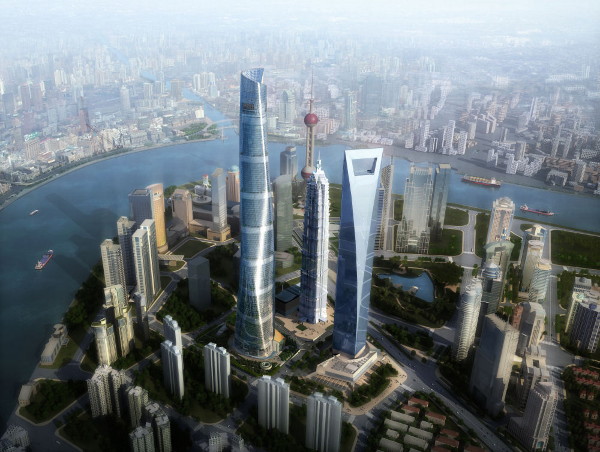 The largest
city in China, one of the largest cities in the world, one of the four
municipalities of China, an important financial, economic, commercial
and cultural center of the country, a comprehensive industrial base and
a famous historical city, the world's largest sea port - and all this,
of course, about the legendary and unique city in the world - Shanghai!
Shanghai has always been the most radical city of China. And as they
call it in the heyday (1920-30s): Paris of the East, Chinese whore,
Oriental Pearl, Queen of the East, City of socialists, communists and
revolutionaries, homeland of the Communist Party of China, City of
adventurers, players, sailors, merchants opium
The largest
city in China, one of the largest cities in the world, one of the four
municipalities of China, an important financial, economic, commercial
and cultural center of the country, a comprehensive industrial base and
a famous historical city, the world's largest sea port - and all this,
of course, about the legendary and unique city in the world - Shanghai!
Shanghai has always been the most radical city of China. And as they
call it in the heyday (1920-30s): Paris of the East, Chinese whore,
Oriental Pearl, Queen of the East, City of socialists, communists and
revolutionaries, homeland of the Communist Party of China, City of
adventurers, players, sailors, merchants opium
Shanghai is located in the Yangtze River Delta. To the east of it is the
East China Sea. The city is divided into two parts, the Huangpu River, a
tributary of the Yangtze River and is bordered by the provinces of
Zhejiang and Jiangsu. The total area of 6340.5 square kilometers of
Shanghai's population in 2008 was 18,000,000 884,600 people. Mainly live
here the Chinese (Han), a small percentage are Dungan and other
nationalities
Guangzhou
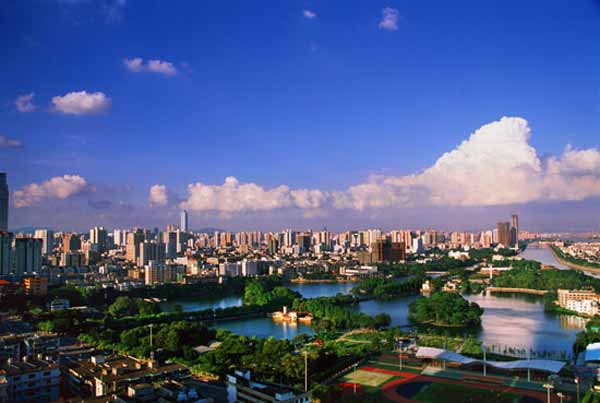 Guangzhou is
the world famous cultural and historical city of China. He is also on
the list of cities that have been published the State Council as the
first cultural and historical city of monuments.
Guangzhou is
the world famous cultural and historical city of China. He is also on
the list of cities that have been published the State Council as the
first cultural and historical city of monuments.
Guangzhou is an industrial "heart" of China, and the famous center of
light industry worldwide. In Guangzhou, there are over hundreds of
wholesale markets, hundreds of thousands of industrial plants and
factories, which produce about a million different kinds of goods.
Today, Guangzhou is on the same route. The capital of the southeastern
province of Guangdong is keen to sea - the main shopping source. After a
time, Guangzhou regained the open position of the city - the goods
produced in the city, known throughout the world.
Guangzhou, capital of Guangdong Province, the South Gate of China - is
the concentration of the economy, politics and culture of the southern
part of China. The history of this city has 2000 years of history - this
is where many centuries ago took back the sea "Silk Road." During the
rule of the Western Han Dynasty, more than 20 centuries ago, there
existed trading port, through which ships from all over the world to
export Chinese goods. Today we can see the remains of the shipyard relic
of the Qin Dynasty and Han Dynasty, which allow to evaluate the
development of shipbuilding in Guangzhou at the time when it was the
main crossing point Silk Road.
The coat of arms of the city shows its symbol - the goats. Legend has it
that one day, riding on them, were the five gods. In the mouth of each
goat had a bunch of five heads to the city was never hungry. It should
be noted that the standard of living in Guangzhou is somewhat higher
than in other cities of China.
Guilin
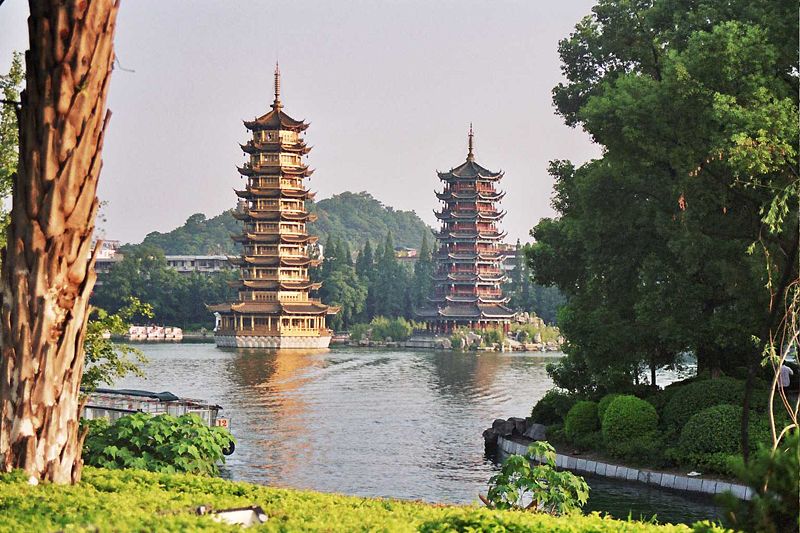 Guilin is
located in a picturesque location. The road into town passes between the
two rivers, and in the place of their merger, south of the city center,
is the symbol of Guilin - Elephant Trunk Hill. Guilin is located in a
picturesque location. The road into town passes between the two rivers,
and in the place of their merger, south of the city center, is the
symbol of Guilin - Elephant Trunk Hill. As the name implies, in the form
of mountain resembles an elephant's trunk and dropped her drinking from
the river. This rock was formed over three hundred million years on the
seabed. But local residents, of course, have their own explanation of
the existence in their mountain town such fabulous shape. According to
legend, the mountain - is petrified of the dagger from the sacred
elephant herds of the Jade Emperor (the lord of the sky from the old
dowry). Elephant disobeyed his master, and did not want to go back to
heaven and leave this beautiful place. In anger, the Emperor struck his
dagger and turned to stone.
Guilin is
located in a picturesque location. The road into town passes between the
two rivers, and in the place of their merger, south of the city center,
is the symbol of Guilin - Elephant Trunk Hill. Guilin is located in a
picturesque location. The road into town passes between the two rivers,
and in the place of their merger, south of the city center, is the
symbol of Guilin - Elephant Trunk Hill. As the name implies, in the form
of mountain resembles an elephant's trunk and dropped her drinking from
the river. This rock was formed over three hundred million years on the
seabed. But local residents, of course, have their own explanation of
the existence in their mountain town such fabulous shape. According to
legend, the mountain - is petrified of the dagger from the sacred
elephant herds of the Jade Emperor (the lord of the sky from the old
dowry). Elephant disobeyed his master, and did not want to go back to
heaven and leave this beautiful place. In anger, the Emperor struck his
dagger and turned to stone.
In the center stands Mount great beauty. To climb to the peak of it to
overcome a journey of three hundred steps. The reward at the end of the
path will be a breathtaking view that opens from the top of the city.
South of the mountains are the ruins of the ancient residence of Ming.
Now there is a pedagogical institute.
Guilin - a fairy tale, otherworldly place of the children's fantasy come
to life, the fantastic beauty of the landscapes painted by hand an
ancient god. After visiting here, you are unlikely to become argue with
those who say that Guilin - one of the most beautiful corners of the
earth. Unusual form karst hills reflected in emerald-mirrored surface
water beautiful river Lintszyan. Boat excursion on the river - an
integral part of the program for the tourist routes through Guilin. If
you're lucky, you can witness the fishing. The method used by local
people for centuries is not very familiar to us. They are tied to a rope
and throw cormorant bird in the water. When cormorants to catch prey,
the fisherman pulls it out of the water and consuming fish, and poultry
is nothing to do but to accept their fate. Do you wish a bird? In vain -
it's her "service." The fact that the cormorant's neck wear ring of a
certain diameter. Small fish gets a bird and swallow prey larger
prevents limiting ring. Therefore, the bird fed, and people bring their
fish to the family table.
Ashore, you can visit the famous stalactite caves, which are located in
the karst hills. The most famous of these is called the Reed Flute Cave.
Since the cave was named after unpretentious musical instruments that
locals cut cane that grows near the caves on the banks of the river
Lintszyan. Karst caves were discovered not long ago, in 1959,
accidentally fell into their farmer. Now the cave had lights and
landscaped it for a safe trip. Subdued light falling on growing from the
floor of the cave stalagmites and stalactites hanging from the top
allows your imagination run wild and see something unique at every bend
of the breed. During a walk through the cave you will not be able to get
rid of the feeling that walking in their command of the underground
king.